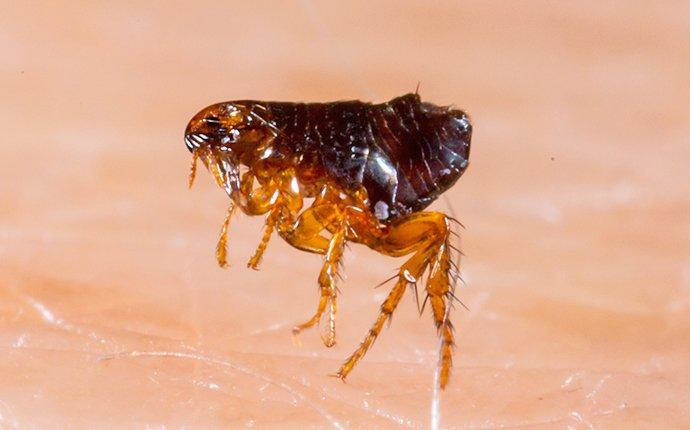When we think about fleas, most of us think of household pets like cats and dogs. But, did you know that your home is vulnerable to fleas even if you don’t have pets? That’s right, even non-pet owners need to be wary of a flea infestation, and we’re here to tell you why. But before we get into the nitty-gritty, let’s take a closer look at fleas.
What Are Fleas?
These tiny insects are small, flat, and flightless. They are external parasites of mammals and birds, and they prefer hairy or furry hosts because they’re easier to latch onto. Here are some other features to help you identify these bloodsuckers.
- About 1/8 inch long
- Biting mouthparts used to pierce the skin of their hosts
- Dark reddish-brown
- Powerful jumping legs that allow them to travel from place to place
- Three pairs of legs
While it’s certainly helpful to be aware of these identifiers, fleas are so tiny that they can be hard to see. They may be attached to their hosts for very long periods of time before being detected if they are detected at all. Because fleas are vector-pests, they can transmit diseases and bacterial infections to their hosts. That puts your health, and that of your pets, at risk. But, before you can even think about that, you’re probably wondering how these tiny parasites even got inside your house, to begin with.
Where Do They Come From?
There are a lot of ways in which fleas find their way into our homes. Because these parasites prefer hosts with hair and fur, it should come as no surprise that they can be brought onto your property not only by your pets but also by nuisance pests like rodents and wildlife.
When fleas attach to their host, not only do they feed, but they also mate and lay eggs. Oftentimes, the eggs fall off of the host and can potentially land anywhere on your property. They’ve been found in bedding and blankets, clothing, and throughout the yard. With so many eggs all over the place, fleas are reproducing and spreading throughout your home. That’s why it’s so easy for pets (and people) to pick them up and bring them inside.
What Can I Do To Prevent Fleas?
If you want to be proactive in your efforts to keep fleas away from your property, there are a lot of factors to consider. First, you need to think about keeping other pests away – pests that could potentially host fleas, like wildlife and rodents. Once you address how to prevent these pests, then you can think about what to do to deal with the fleas themselves. Here are some helpful ways to reduce your chances of experiencing a flea infestation.
- Clear away yard debris and keep lawn and vegetation well-trimmed.
- Clear clutter and vacuum carpets, floors, furniture, and crevices where fleas can easily hide.
- If you do have pets, treat them with a flea bath and/or flea spray.
- Regularly wash all bedding, linens, laundry, and upholstery on high heat.
- Use outdoor flea repellent on the exterior of your home to reduce the chances of infestation.
- Vacuum any eggs and properly dispose of the vacuum bag in a sealed trash can.
If you suspect flea activity in your home, or you just want to secure protection for the future, give us a call today. The professionals at Romney Pest Control are here to provide assistance and answer all of your flea prevention questions. Reach out to us today to set up an initial inspection, and we’ll get started on thoroughly protecting your home, pets, and loved ones from the dangers of flea infestation.




